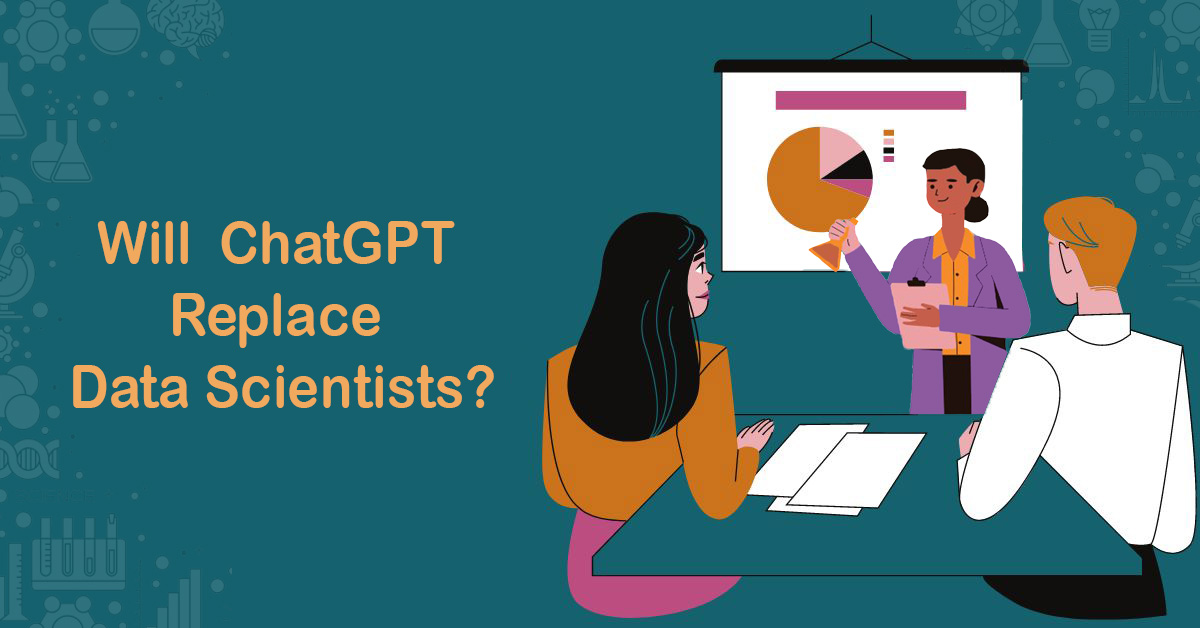
Are you wondering if your job as a data scientist is at risk of becoming obsolete? With the recent advancements in artificial intelligence and machine learning, many people are asking whether ChatGPT will soon take over the work of human data scientists.
ChatGPT can transform the field of data science, but it won’t fill the role of data scientists. Whether you’re a seasoned data scientist, an AI enthusiast, or just someone curious about the future of technology, this article is for you.
In this article, we will explore whether ChatGPT will replace data scientists or not.
What is the Future Impact of ChatGPT on Data Scientists?
According to the Bureau of Labor Statistics, employment of data scientists will grow by 36 percent from 2021 to 2031.
The impact of ChatGPT on data scientists in the future is expected to be significant. ChatGPT has the potential to automate certain tasks and improve the efficiency of data analysis, which could lead to changes in the role of data scientists.
Here are some ways ChatGPT may impact data scientists in the future:
Increased Efficiency
ChatGPT can automate certain tasks like data cleaning, preprocessing, and analysis, which can save data scientists a significant amount of time. This can free up time for data scientists to focus on more complex tasks, such as developing machine learning models.
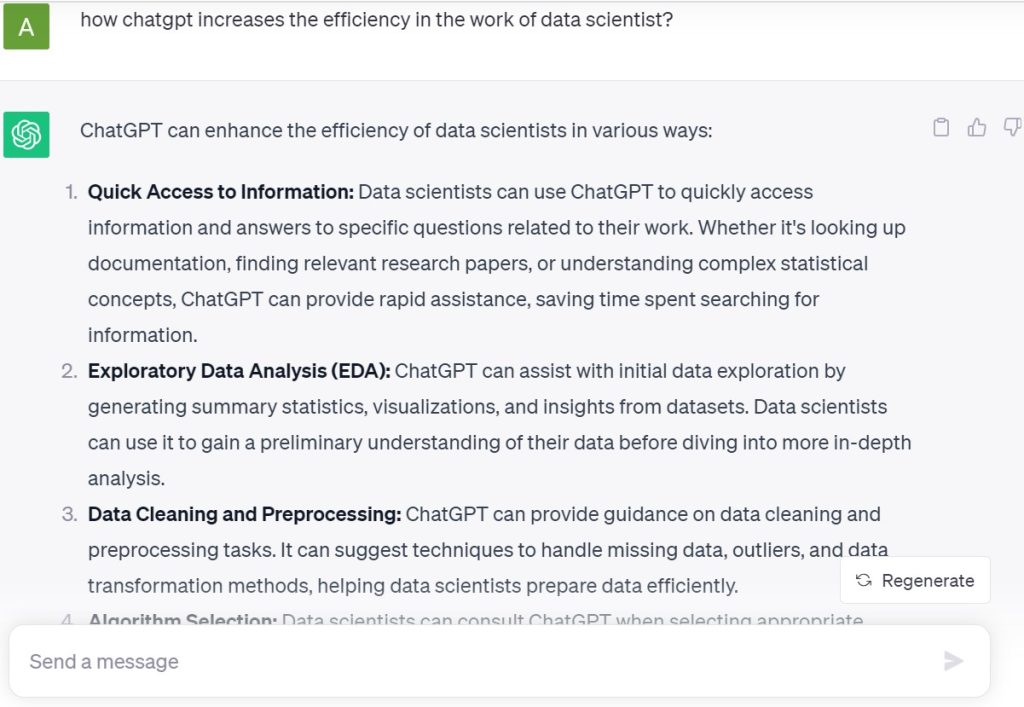
Improved Data Quality
ChatGPT can help to improve the quality of data by identifying inconsistencies, errors, and biases in the data. This can help data scientists to make more accurate and reliable decisions based on the data.
New Opportunities for Innovation
ChatGPT can help data scientists generate new ideas and hypotheses based on the analysis of large amounts of data. This can lead to new insights and discoveries, which can drive innovation in various industries.
Need for Adaptation
The integration of ChatGPT and other AI technologies into the data science workflow will require data scientists to adapt to new tools and methods.
Data scientists will need to develop new skills in AI and natural language processing to effectively integrate ChatGPT into their workflows.
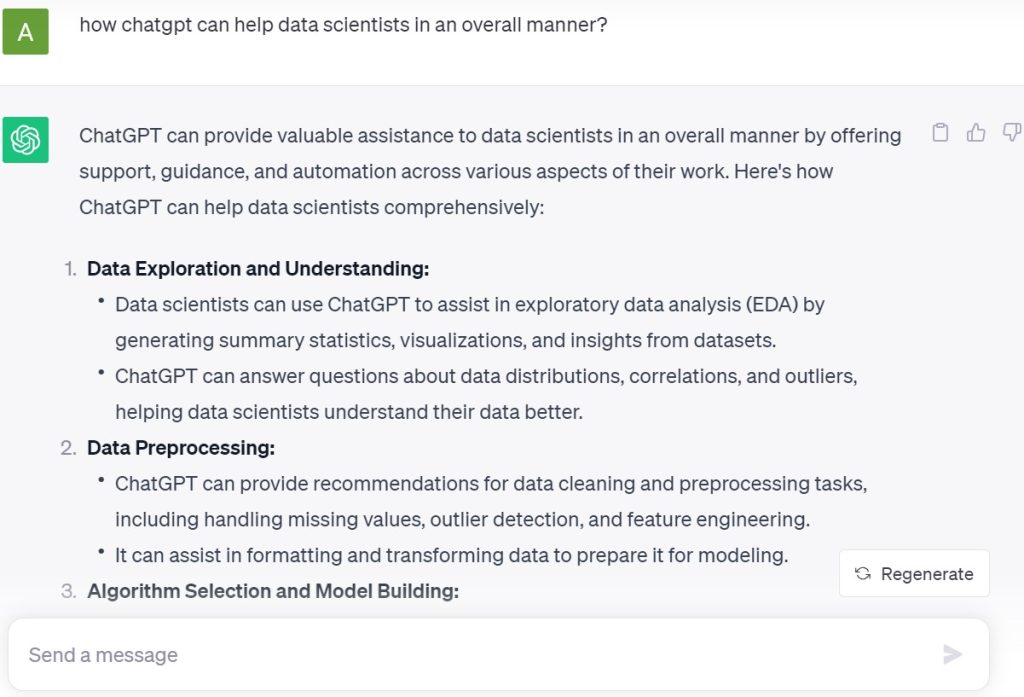
Potential for Collaboration
ChatGPT can facilitate collaboration between data scientists and other professionals in an organization. For example, ChatGPT can help to communicate data insights to stakeholders who may not have a technical background.
Why ChatGPT Cannot Replace Data Scientists?
ChatGPT can help data scientists perform their roles effectively, but it cannot replace them completely. There are many reasons why ChatGPT, for all its brilliance and advanced features, cannot replace data scientists.
Limited Data Inputs
One of the main limitations of ChatGPT is that it relies heavily on the data inputs that it’s been trained on. This means that the model may not be able to provide accurate results if it’s presented with data that are outside of its training data set.
In contrast, data scientists have the ability to work with a wide range of data sources and use their expertise to analyze and interpret this information.
For example, let’s say that we’re analyzing customer data for a retail store. ChatGPT may be able to generate insights based on the data it’s been trained on, but it may not be able to incorporate data from sources such as social media, competitor analysis, or market trends.
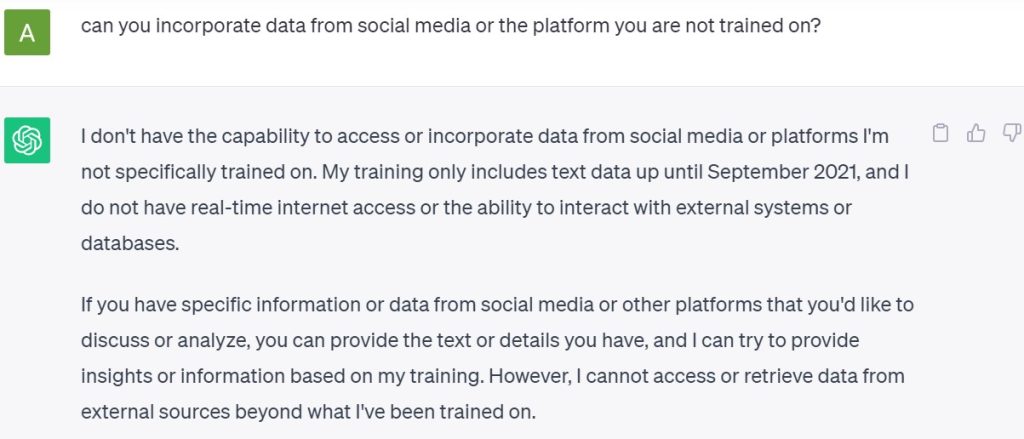
Data scientists, on the other hand, can use their knowledge to integrate these disparate data sources and gain a more comprehensive understanding of the customer landscape.
Lack of Domain Expertise
ChatGPT lacks domain expertise. While it can generate text based on patterns it has learned from training data, it cannot provide insight based on contextual knowledge or experience in a particular industry. This is where data scientists have an advantage.
Let’s consider a pharmaceutical company that is trying to develop a new drug. ChatGPT may be able to generate some insights based on the data it’s been trained on, but it won’t have the specialized knowledge and expertise that a data scientist with a background in pharmacology could bring to the table.
Data scientists can provide valuable insights that go beyond the data itself, such as the impact of government regulations, the feasibility of clinical trials, and potential ethical considerations.
Inability to Recognize Biases
One of the biggest concerns with AI models like ChatGPT is their potential to reinforce existing biases in the data. This is because the model is trained on a data set that may already contain biases, and it can’t always recognize these biases and adjust its output accordingly.
In contrast, data scientists can recognize and adjust for biases in the data, ensuring that the analysis is objective and fair. Let’s say we have a data set on loan approvals. If the data set contains biases such as racial or gender discrimination, ChatGPT may perpetuate these biases in its analysis.
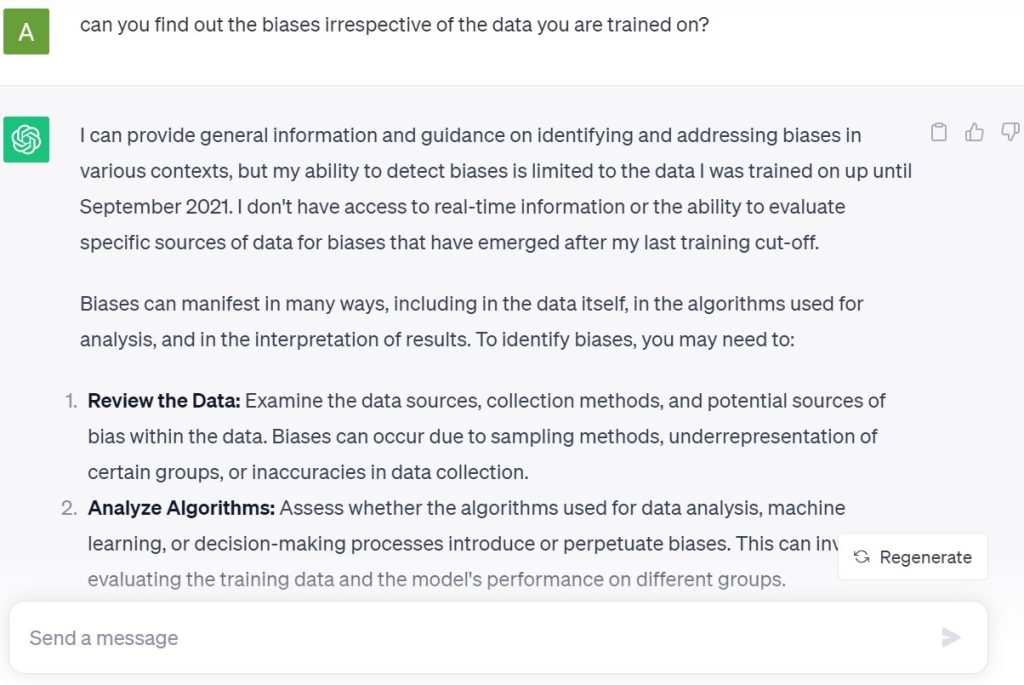
However, a data scientist can recognize these biases and take steps to mitigate them, such as removing irrelevant variables, using oversampling or undersampling techniques, or developing new models to correct for bias.
What Areas Can ChatGPT Replace Data Scientists?
Can ChatGPT replace data scientists? While we’ve previously discussed why ChatGPT cannot completely replace data scientists, there are still some areas where it can be an effective tool. Here are some of the areas where ChatGPT can replace data scientists:
Data Preprocessing
ChatGPT can be especially useful in data preprocessing. This refers to the cleaning, transforming, and restructuring of raw data to prepare it for analysis.
Data preprocessing is often time-consuming and laborious, but it’s crucial to ensure that the analysis is accurate and reliable. ChatGPT can be used to automatically clean and preprocess the data, such as removing irrelevant information, standardizing text, and detecting/removing duplicates.
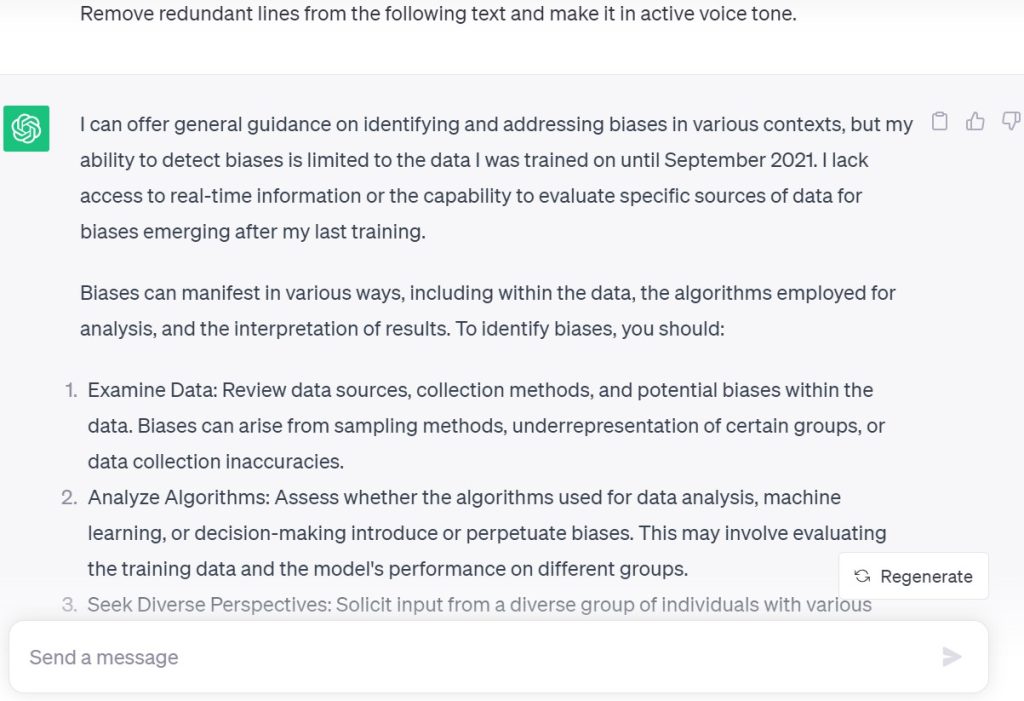
This can save data scientists a significant amount of time and effort, allowing them to focus on more complex analysis tasks.
Natural Language Processing (NLP)
NLP is a subfield of artificial intelligence that deals with the interaction between computers and human language. ChatGPT, as a language model, is especially proficient in this area and can be used to analyze, understand, and generate natural language text.
As an example, we want to analyze customer sentiment in a large volume of social media posts. ChatGPT can be used to automatically analyze the text and identify the sentiment of the post, whether it’s positive, negative, or neutral.
Text Generation and Summarization
ChatGPT can also be useful in generating and summarizing text. It has the ability to generate natural language text that’s similar to what a human might write. This can be useful in generating reports, summaries, or even product descriptions.
We want to generate a summary of a long and complex report. ChatGPT can be used to automatically summarize the report, extracting the most important information and presenting it in a concise and readable format. Here’s an example of such a scenario:
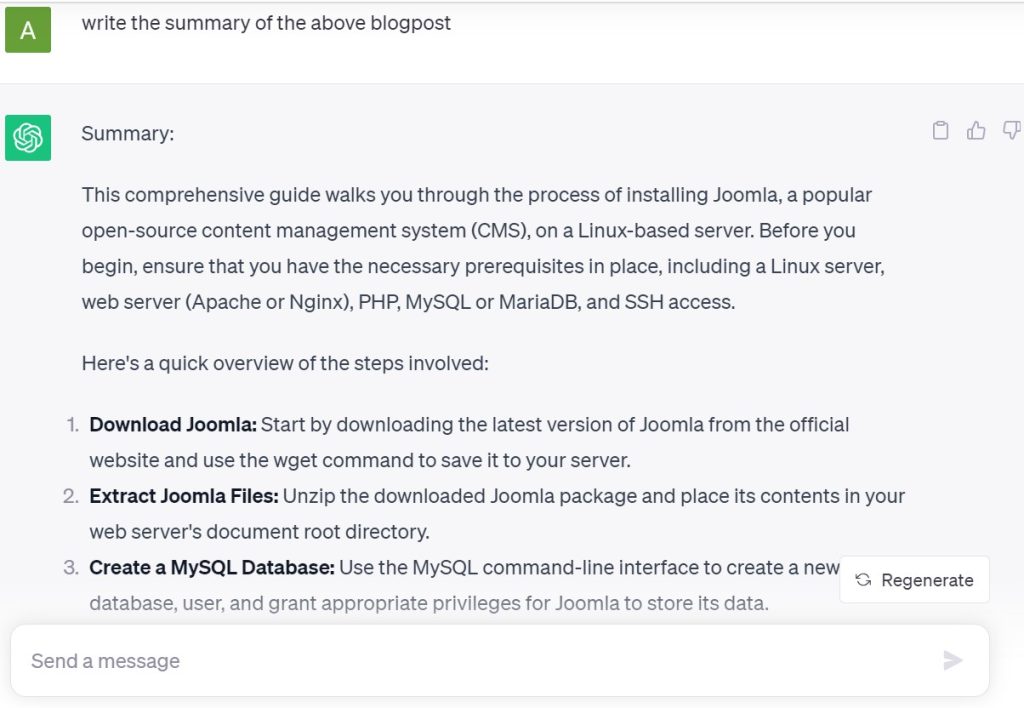
What Areas Will ChatGPT Struggle to Replace Data Scientists?
With the rise of advanced AI technologies like ChatGPT, there has been much speculation about whether these tools could replace human data scientists entirely.
While it’s true that AI can automate many aspects of data analysis, there are still certain areas where human expertise is essential to producing accurate and meaningful results. Here are some areas where ChatGPT may struggle to fully replace data scientists:
Domain Knowledge
Domain knowledge refers to the specific expertise and understanding of a particular industry or subject area. Data scientists often have specialized knowledge in their particular field that allows them to interpret and analyze data in a meaningful way.
For example, a data scientist working on a diagnosis with a background in medicine would have a deep understanding of the relevant terminology, procedures, and clinical implications of the data. ChatGPT may be able to analyze the data, but it would lack the specialized knowledge necessary to truly understand and interpret the results.
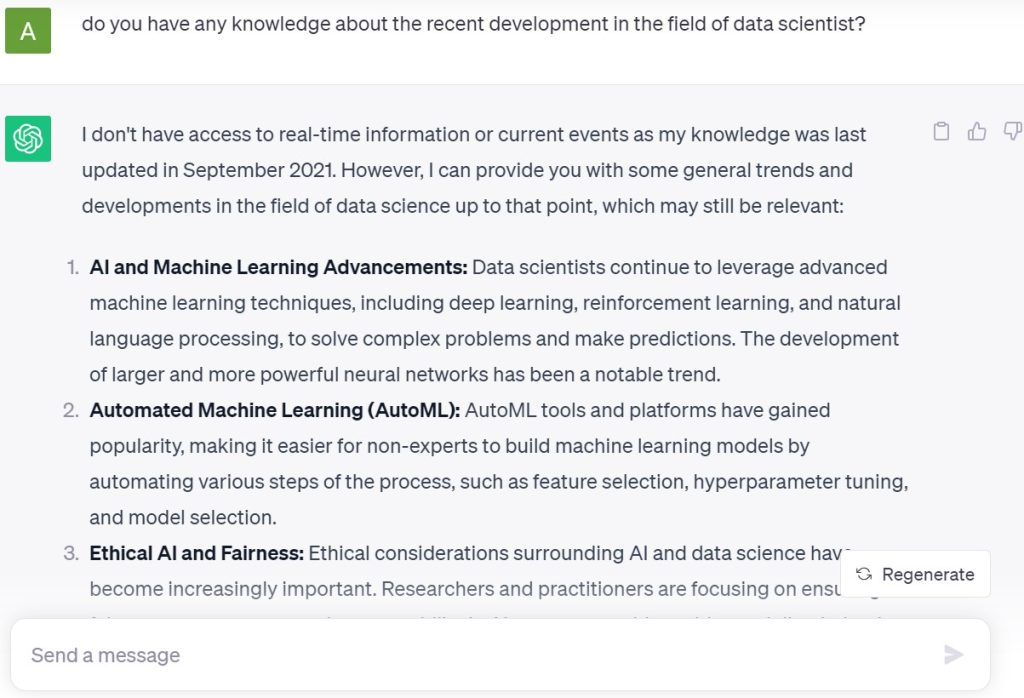
Creative Problem Solving
While ChatGPT can be used to automate certain tasks, it lacks the ability to think creatively and come up with new and innovative solutions to complex problems.
Let’s say we are working on a project to develop a new product. Data scientists may be able to use their creative problem-solving skills to come up with new and innovative ideas for the product, whereas ChatGPT would be limited to analyzing existing data and providing insights based on that data.
Ethical Considerations
Data science often involves sensitive information and decisions that can have a significant impact on individuals or society as a whole.
Data scientists are trained to consider the ethical implications of their work and ensure that their analyses are fair, unbiased, and ethical.
We have a project to develop a new algorithm to predict credit risk. A data scientist would need to consider the potential biases in the data and ensure that the algorithm does not unfairly discriminate against certain individuals or groups.
ChatGPT, on the other hand, cannot make ethical considerations and may produce results that are unintentionally biased or unfair. Let’s take it from ChatGPT what it says about ethical consideration:
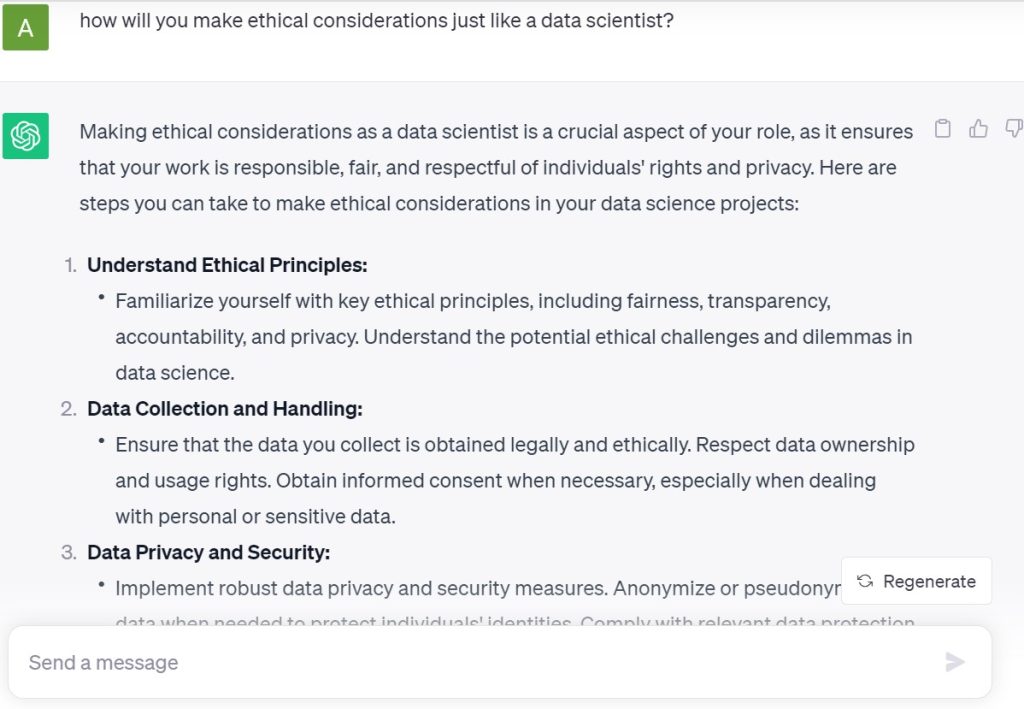
FAQs
Can ChatGPT Affect Data Science?
Yes, ChatGPT can have a significant impact on data science. It can be used to automate certain tasks, analyze data more quickly and accurately, and even generate insights that humans may not have thought of.
However, ChatGPT is not a replacement for human expertise and creativity in the field of data science.
Will Data Scientists Be Replaced By Robots?
No, it’s highly unlikely that robots will completely replace human data scientists. While AI tools like ChatGPT can automate certain aspects of data analysis, there are still areas where human expertise and creativity are essential.
Data scientists have a deep understanding of their field and can apply their expertise to solve complex problems that may not be solvable by AI alone.
Is There a Future for Data Scientists?
Absolutely! As long as there is data to analyze, there will always be a need for data scientists. In fact, with the increasing amount of data being generated every day, the demand for skilled data scientists is only growing.
The future of data science is bright and full of opportunities for those with the right skills and expertise.
Will ChatGPT Replace Data Analysts?
While ChatGPT can certainly assist data analysts in their work, it’s unlikely that it will completely replace them.
Data analysts have specialized knowledge and expertise that are essential for understanding and interpreting data in a meaningful way. ChatGPT can automate certain tasks, but it lacks the human creativity and problem-solving skills that are required for effective data analysis.
Will ChatGPT4 Replace Data Science Jobs?
No, ChatGPT4 or any other AI tool will not replace data science jobs entirely. While AI can automate certain tasks and make data analysis more efficient, it cannot replace human expertise and creativity.
Data science jobs require a deep understanding of the field, as well as the ability to think creatively and solve complex problems. As such, human data scientists will always be essential to the field of data science.